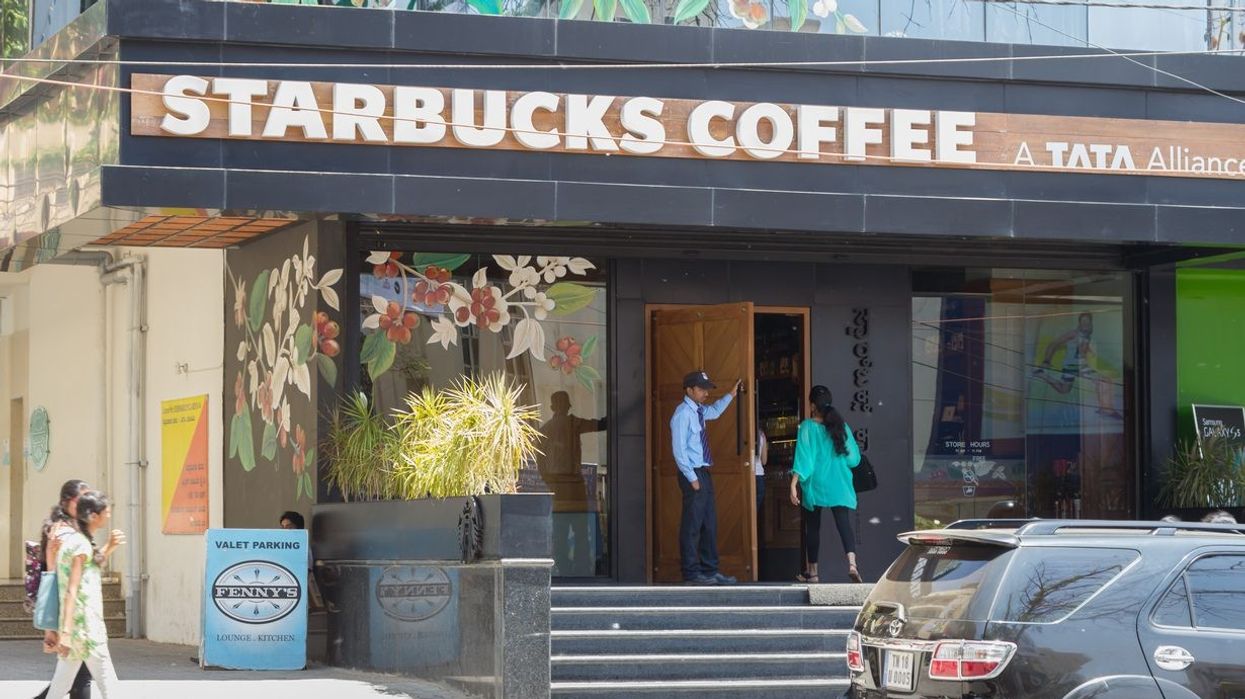STARBUCKS is revamping its strategy to lure Indians, including children, with smaller, cheaper beverages as it looks to expand in small towns amid a fierce challenge from domestic startups in one of its fastest-growing markets.
Among the first foreign coffee brands to enter tea-loving India, the US giant has taken almost 11 years to open 343 stores, in contrast with private equity-backed chains Third Wave and Blue Tokai that opened about 150 in the last three years.
"As you grow in size, you need to get new consumers," said Sushant Dash, the chief executive of Starbucks in India, adding that the chain's "pricing play" would help shatter a perception that it is expensive.
The company has launched a six-ounce drink, "Picco", which starts at $2.24, and milkshakes for $3.33 as part of its revamp to target affluent Indians who prefer smaller servings.
Starbucks plans to open more stores in smaller towns, said an industry source, who spoke on condition of anonymity.
Both its new offerings are unique to India and unavailable in China, Singapore and the United States.
India's small but fast-growing specialty tea and coffee cafe market is worth $300 million and set to grow 12 per cent each year, Euromonitor estimates. Canada's Tim Hortons and Britain's Pret A Manger are also expanding, but have only a handful of outlets.
"Excessively large portion sizes are an American phenomenon," said Devangshu Dutta, head of retail consultancy Third Eyesight.
"Indian consumers are value-conscious. If adjusting portion sizes down to what is more normal helps make prices accessible, that's a double win."
He was among the analysts who felt the move by Starbucks, operating in India in a joint venture with Tata Group, could further boost its sales, which hit a record $132 million in fiscal 2022/23.
Although Starbucks still dominates in India, rivalry is fizzing in the capital, New Delhi, and the technology hub of Bengaluru, where many Third Wave cafes are often as crowded as Starbucks outlets.
"We've lost 30 cups a day to them," said a barista at a Starbucks shop in Delhi that sells 7,500 drinks a month, referring to a Third Wave that opened nearby months ago, but already sells 3,700.
Starbucks has faced homegrown challengers elsewhere, most notably in China, where its 6,200 stores service the biggest market outside the United States.
There, in just the last five years, Luckin Coffee has used discounts to lure customers to its 10,000 mostly pickup or delivery stores.
In India, where Starbucks has added domestic touches to its offerings over the years to boost their appeal, it is now stepping up that game, just as global giants McDonald's and Domino's have done.
It estimates that just 11 per cent of Indian homes drink coffee, as opposed to 91 per cent drinking tea. Hot milky tea, or "chai" as it is known in Hindi, is sold at roadside stalls by the hundreds of cups each day for as little as Rs 10 (12 US cents).
Starbucks, which offered for years just one milk chai "latte" made with tea syrup, has launched "Indian-inspired" tea offerings laced with spices and cardamom, both favourites in many Indian homes, which start at Rs 185 rupees ($2.24).
The drinks were introduced to attract those who do not drink coffee and shun Starbucks, said Dash, adding the company would retain its focus on coffee and not make chai a primary offering.
The launch of smaller, cheaper beverages in India indicates Starbucks may have seen "a decline in traffic related to a pushback" on higher prices, said Chas Hermann, a US-based restaurant consultant and former Starbucks executive.
Competition
In May, people lured by a one-for-one offer queued in a street outside the first Starbucks store in the western city of Aurangabad, a YouTube video showed in scenes reminiscent of when it first opened in India.
But its rivals are catching up and a price war has begun.
Soon after Starbucks' May launch of $3.33 milkshakes, designed to attract children, Third Wave launched its own range, a fifth cheaper at $2.71.
In Bengaluru, startup investors and founders hold meetings in Third Wave outlets. It has more than 40 stores there, exceeding the 35 of Starbucks, data from real estate analytics firm CRE Matrix shows.
Third Wave's chief executive, Sushant Goel, said he planned to add 60 to 70 stores every year, with a focus on big cities. He saw Starbucks' cheaper, small-sized drinks as a response to competition in "an incredibly price-sensitive market".
Matt Chitharanjan, chief executive of Blue Tokai, said it had "seen success in converting customers from Starbucks", partly because of lower prices.
While Dash said he was undeterred by competition, Starbucks recognises the threat, although privately.
In one lease deal for a Bengaluru mall reviewed by Reuters, Starbucks inserted a "cafe exclusivity" clause barring the mall owner from allotting space on the same floor to rival "premium" brands, including Third Wave and Blue Tokai.
"Going deeper into smaller cities, beyond the metros, is the only way to grow," said Ankur Bisen, head of retail at India's Technopak Advisors.
(Reuters)
Starbucks brews up cheaper India drinks as domestic rivals expand
American brand still sought after by many affluent Indians




